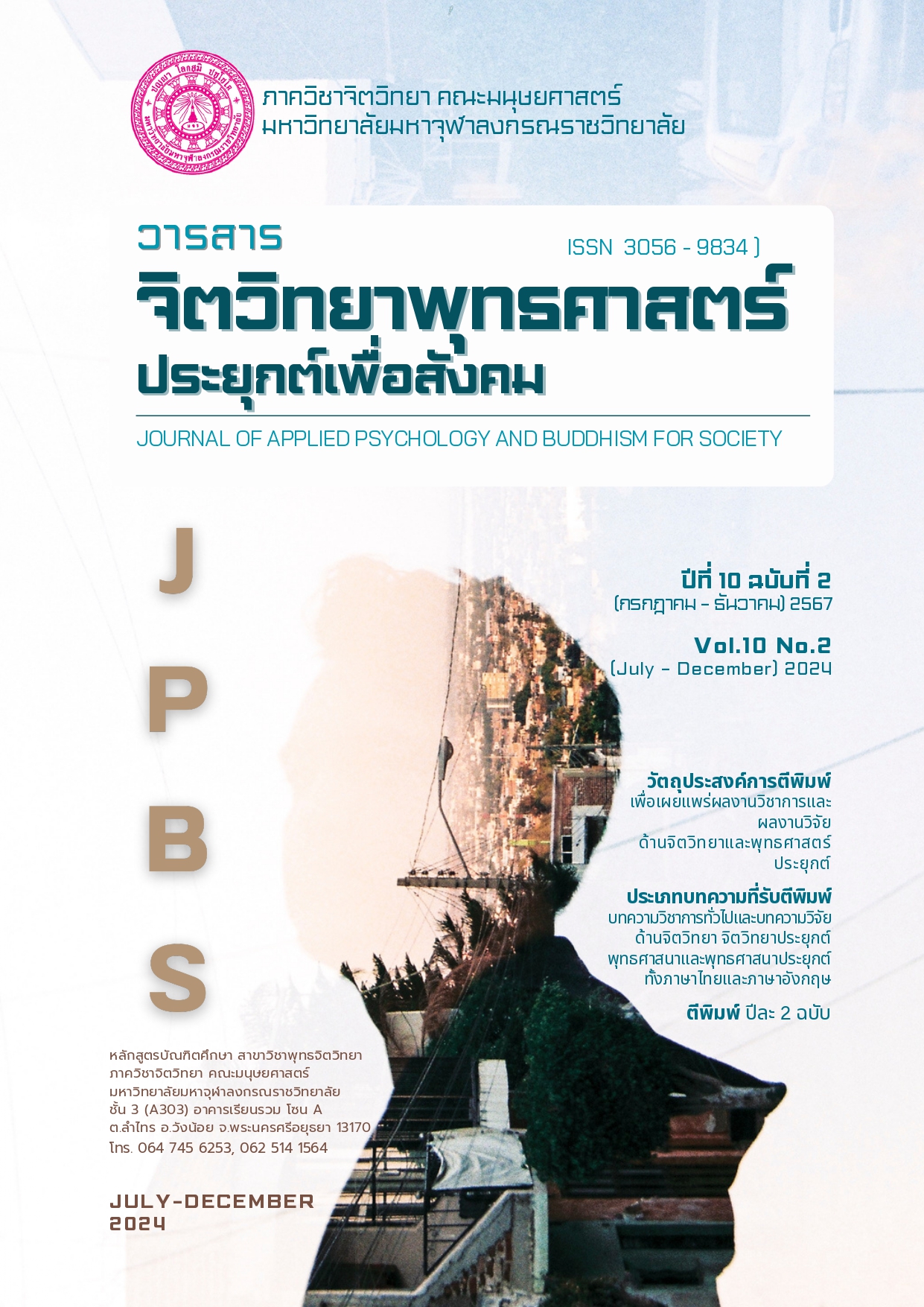Achieving Sales Success through Buddhist Ethical Principles
Keywords:
Sales, Ethics, Dithadhammikattha, Iddhipada 4, Hiri, OttappaAbstract
This academic article presents the concept of achieving sales success through Buddhist ethics. In the current economic climate, where growth is slow and competition is intense, sales success is often measured by business metrics such as sales volume, market share, and profits. However, this focus can lead to the neglect of ethical standards. This article proposes a pathway to sales success based on Buddhist principles, particularly the
Dithadhammikattha (the Four Treasures of Success: U, A, Ka, Sa) and the Iddhipada 4 (the Four Paths to Success: Chanda, Viriya, Citta, and Vimamsa). When sales representatives cultivate passion for their work, demonstrate persistent effort, maintain good relationships with colleagues and clients, focus on their tasks, and consistently analyze and refine their sales strategies, they are more likely to achieve success. This includes meeting
sales targets, earning a good income, and securing opportunities for promotion. However, sustained success in sales can only be achieved if salespeople are honest and adhere to ethical principles. To maintain ethical awareness and mindfulness, it is important to practice meditation to cultivate sati (mindfulness), as well as hiri (moral shame) and ottappa (moral dread) to avoid wrongdoing. Therefore, integrating the principles of Dithadhammikattha and Iddhipada 4 for achieving success, along with mindfulness and the practices of hiri and ottappa, will help salespeople achieve business success while upholding ethical standards and social responsibility. Ethical sales based on Buddhist principles foster customer trust, enhance client retention, and ensure sustainable success in both business and societal aspects. Additionally, this approach promotes an organizational culture rooted in ethics and accountability to all stakeholders.
References
คณะกรรมการกลุ่มผลิตคู่มือปฏิบัติงานสำหรับตัวแทนประกันชีวิต สำนักงานคณะกรรมการกำกับและส่งเสริมการประกอบธุรกิจประกันภัย (คปภ.). (2558). คู่มือปฏิบัติงานสำหรับตัวแทนประกันชีวิต หลักสูตรขอต่อใบอนุญาตตัวแทนประกันชีวิต ครั้งที่ 2. กรุงเทพฯ : สำนักงานคณะกรรมการกำกับและส่งเสริมการประกอบธุรกิจประกันภัย (คปภ.).
จารุวรรณ เมืองเจริญ, วิโรจน เจษฎาลักษณ และ จันทนา แสนสุข. (2565). การสังเคราะห์งานวิจัยด้านความสามารถในการพัฒนาสมรรถนะของพนักงานขาย. วารสารสันติศึกษาปริทรรศน์ มจร, 10(6), 2735-2748.
ญาณเดช ทองสิมา และ จีระภา เอมะสิทธิ์. (2523). การบริหารงานขาย (พิมพ์ครั้งที่ 3). กรุงเทพฯ : มหาวิทยาลัยธรรมศาสตร์.
ฏาว แสงวัณณ์. (2559). การศึกษาความสัมพันธ์ระหว่างสติ การกำกับอารมณ์แบบปรับปลี่ยนความคิดการกำกับอารมณ์แบบเก็บกดและสุขภาวะทางจิต (วิทยานิพนธ์ปริญญาศิลปศาสตรมหาบัณฑิต). จุฬาลงกรณ์มหาวิทยาลัย. กรุงเทพฯ.
ธนาคารเพื่อการส่งออกและนำเข้าแห่งประเทศไทย. (2567). จริยธรรมของพนักงาน EXIM. สืบค้น 28 สิงหาคม 2567, จาก https://www.exim.go.th/th/About-Exim-Thailand/Corporate-Governance/Employee-Ethics.aspx
ธานี กลิ่นเกษร. (2539). ผลของการฝึกอบรมทางพุทธศาสนาเพื่อพัฒนาหิริ-โอตัปปะและทัศนคติต่อพุทธศาสนาของนักศึกษาวิทยาลัยเทคนิคพัทลุง. กรุงเทพฯ : วารสารพฤติกรรมศาสตร์ มหาวิทยาลัยศรีนครินทรวิโรฒ ประสานมิตร, 2(1),109-117.
พระปลัดภัครวัฒน์ สีลเตโช. (2564). วิเคราะห์คุณสมบัติของพ่อค้าในเสรีววาณิชชาดก. วารสารเสฏฐวิทย์ปริทัศน์, 1(2), 13-26.
พระไพศาล วิสาโล.(2553). เป็นไทย เป็นพุทธและเป็นสุข. กรุงเทพฯ : เครือข่ายพุทธิกา.
พัชรา ตันติประภา. (2545). ภาวะที่นำสู่ปัญหาด้านจริยธรรมในการขายและความแตกต่างในการรับรู้ของนักศึกษานักวิชาการ พนักงานขายและผู้บริหารหน่วยงานขาย (รายงานวิจัยฉบับสมบูรณ์). กรุงเทพฯ : สำนักงานกองทุนสนับสนุนการวิจัย.
ภาคิน สีสุธรรม. (2561). การพัฒนาประสิทธิภาพการปฏิบัติงานของเจ้าหน้าที่ตํารวจสถานีตํารวจภูธรเมืองนนทบุรีตามหลักพุทธบูรณาการ. วารสารพุทธศาสน์ศึกษา จุฬาลงกรณ์มหาวิทยาลัย, 25(2), 49-64.
มหาจุฬาลงกรณราชวิทยาลัย. (2539). พระไตรปิฎกภาษาไทย ฉบับมหาจุฬาลงกรณราชวิทยาลัย. กรุงเทพฯ : โรงพิมพ์มหาจุฬาลงกรณราชวิทยาลัย.
“______”. (2559). อรรถกถาภาษาไทย ฉบับมหาจุฬาลงกรณราชวิทยาลัย. กรุงเทพฯ : โรงพิมพ์มหาจุฬาลงกรณราชวิทยาลัย.
รัตนา ชัยกัลยา และ ปริญ ลักษิตามาศ. (2558). จริยธรรมผู้แทนขายที่ส่งผลต่อคุณภาพความสัมพันธ์กับลูกค้าอุปกรณ์เครื่องมือการแพทย์. วารสารวิชาการมหาวิทยาลัยธนบุรี, 9(18), 49–59.
วิจัยกรุงศรี. (2567). แนวโน้มธุรกิจและอุตสาหกรรมไทยปี 2567-2569. สืบค้น 24 สิงหาคม 2567, จาก https://www.krungsri.com/th/research/industry/summary-outlook/industry-outlook-2024-2026
วิชัย วนาพรรณ์. (2527). ระดับจริยธรรมของนักเรียนชั้นมัธยมศึกษาปีที่ 3 ในเขตการศึกษา 12 ปีการศึกษา 2526 (วิทยานิพนธ์ครุศาสตรมหาบัณฑิต). จุฬาลงกรณ์มหาวิทยาลัย. กรุงเทพฯ.
สมเด็จพระพุทธโฆษาจารย์ (ป. อ. ปยุตฺโต). (2546). พจนานุกรมพุทธศาสตร์ ฉบับประมวลธรรม (พิมพ์ครั้งที่ 12). กรุงเทพฯ : โรงพิมพ์มหาจุฬาลงกรณราชวิทยาลัย.
“_______”. (2564). พจนานุกรมพุทธศาสน์ ฉบับประมวลศัพท์ (พิมพ์ครั้งที่ 35). กรุงเทพฯ : บริษัท สหธรรมิก จำกัด.
“_______”. (2553). พุทธธรรม ฉบับปรับขยาย (พิมพ์ครั้งที่ 31). กรุงเทพฯ: มูลนิธิบรรจงสนิทและสำนักสหปฏิบัติพร้อมทั้งคณะผู้ศรัทธา.
สมาคมผู้วิจัยและผลิตเภสัชภัณฑ์หรือพรีม่า (PReMA). (2019). The content handbook for medical representative accreditation program (MRAP) (Version 2). กรุงเทพฯ : สมาคมผู้วิจัยและผลิตเภสัชภัณฑ์.
สมาคมอุตสาหกรรมเทคโนโลยีเครื่องมือแพทย์ไทย. (2565). หลักจรรยาบรรณด้านการขายและการตลาด (พิมพ์ครั้งที่ 5). กรุงเทพฯ : สมาคมอุตสาหกรรมเทคโนโลยีเครื่องมือแพทย์ไทย.
สาวิตรี ละครพล, ปิยะฉัตร จารุธีรศานต์, ดุษฎี โยเหลา และ เกรียงไกรยศ พันธุ์ไทย. (2563). ปัจจัยที่ส่งผลต่อความสำเร็จของพนักงานขาย สำหรับองค์การธุรกิจผลิตยาแผนปัจจุบันในประเทศไทย. วารสารเครือข่ายส่งเสริมการวิจัยทางมนุษยศาสตร์และสังคมศาสตร์, 3(3), 39-53.
Churchill, G. A., Ford, N. M., & Walker, O. C. (1997). Sales Force Management (5th edition). Chicago: Irwin McGraw-Hill.
Crosby, L. A., Evans, K. R., & Cowles, D. (1990). Relationship Quality in Services Selling: An Interpersonal Influence Perspective. Journal of Marketing, 54(3), 68–81.
DeTienne, K. B., Alessandri, A., Aleo, A., & Agle, B. R. (2022). Building Value through Sales Ethics. Journal of Creating Value, 8(1), 10–24.
Feruglio, S., Panasiti, M. S., Crescentini, C., Aglioti, S. M., & Ponsi, G. (2023). Training the Moral Self: An 8-Week Mindfulness Meditation Program Leads to Reduced Dishonest Behavior and Increased Regulation of Interoceptive Awareness. Mindfulness, 14(11), 2757–2779.
Geiman, S. K. (2023). Bright Guardians of the Way and the World: Penthos and Hiri-Ottappa. Buddhist–Christian Studies, 43(1), 127–137.
Jobber, D., & Lancaster, G. (2015). Selling And Sales Management (10Th Edition). London: Pearson education.
Jon Kabat-Zinn. (2021). Mindfulness meditation for everyday life. London: Piatkus Books.
Li, Y., Wei, L., Zeng, X., & Zhu, J. (2021). Mindfulness in ethical consumption: the mediating roles of connectedness to nature and self-control. International Marketing Review, 38(4), 756–779.
Lussier, B., Philp, M., Hartmann, N. N., & Wieland, H. (2021). Social anxiety and salesperson performance: The roles of mindful acceptance and perceived sales manager support. Journal of Business Research, 124, 112–125.
McClelland, David C. (1961). The Achieving Society. Princeton, N.J. :Van Nostrand.
Mulki, J. P., Jaramillo, J. F., & Locander, W. B. (2009). Critical Role of Leadership on Ethical Climate and Salesperson Behaviors. Journal of Business Ethics, 86(2), 125–141.
Steers, R. M. (1991). Introduction to organizational behavior (4th edition). New York: HarperCollins Publishers.
Downloads
Published
How to Cite
Issue
Section
Categories
License
Copyright (c) 2024 Journal of Applied Psychology and Buddhism for Society

This work is licensed under a Creative Commons Attribution-NonCommercial-NoDerivatives 4.0 International License.






